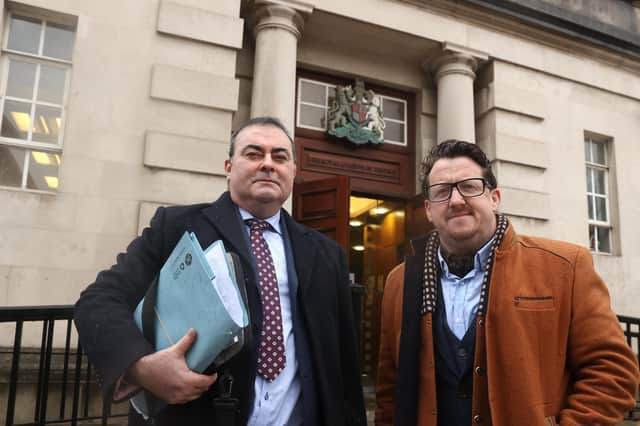DUP ‘openly defying’ court ruling


A judge was urged to order the party’s representatives to end their “unsophisticated wriggling” against a legal duty and begin moves towards attending the cross-border conferences.
Counsel for a Belfast businessman challenging their withdrawal argued that fundamental constitutional structures could founder unless First Minister Paul Givan is compelled to set a date for the next major gathering.
Advertisement
Hide AdAdvertisement
Hide AdReserving judgment in the developing litigation, Mr Justice Scoffield pledged to give a decision before Christmas.
Sean Napier has taken legal action against the DUP’s five Stormont ministers for snubbing North South Ministerial Council (NSNC) events.
Under Stormont rules, both a unionist and a nationalist minister must participate.
The party’s disengagement forms part of its opposition to the Northern Ireland Protocol.
Advertisement
Hide AdAdvertisement
Hide AdMr Napier issued proceedings against Mr Givan, Junior Minister Gary Middleton, Economy Minister Gordon Lyons, Education Minister Michelle McIlveen, and Agriculture Minister Edwin Poots.
In October the party’s boycott was declared an unlawful breach of the pledge of office.
Despite that ruling, there has been no apparent change to the DUP’s position.
Mr Napier’s lawyers returned to court yesterday seeking an “incremental” order of mandamus aimed at ensuring the DUP attends NSMC events.
Advertisement
Hide AdAdvertisement
Hide AdRonan Lavery QC detailed how the first stage should involve directing the first minister to set a date for a plenary meeting which was to be held this month and attended by the heads of the administrations on both sides of the border.
Counsel insisted that Mr Givan cannot avoid legal obligation on the basis of claiming that no meetings are scheduled unless he signs off on them.
“Where there appears to be open defiance, or an illusory defence made after the event, then at the very least the perception of the rule of law founders,” Mr Lavery submitted.
Mr Justice Scoffield was told that since he held the party’s stance to be unlawful conscientious attempts have been made to thwart the terms of his judgment.
Advertisement
Hide AdAdvertisement
Hide AdSetting out a chronology of events, Mr Lavery said that since September up to eight out of 11 meetings did not proceed as intended.
He contended that correspondence between Mr Givan and the Sinn Fein Deputy First Minister Michelle O’Neill provided no legitimate explanation for the DUP’s position.
“That’s not an answer to the behaviour at all, it’s just the basis upon which he feels he can justify the stymieing of his statutory duty, which doesn’t stack up,” the barrister claimed.
The court also heard how Ms O’Neill wrote back, telling Mr Givan: “You are focusing on practical arrangements on scheduling meetings as cover for a publicly declared and unlawful boycott with the intention ... of avoiding contempt of court.”
Advertisement
Hide AdAdvertisement
Hide AdShe described the forthcoming plenary meeting as having critical importance.
Because of the joint nature of their office, Mr Givan and Mr Middleton remain legally unrepresented in the proceedings.
But Tony McGleenan QC, for the other three DUP ministers, countered that an order should be avoided due to the circumstances.
“We are dealing with an obligation to engage in a tripartite agreement in an inherently and contested political sphere,” he said.
Advertisement
Hide AdAdvertisement
Hide Ad“There’s not a single example of a mandatory order of that nature being made.”
Following closing arguments Mr Justice Scoffield said he would give a ruling as soon as possible.
He added: “This is a case of some political sensitivity and some political importance. I want to reflect on the submissions made.”